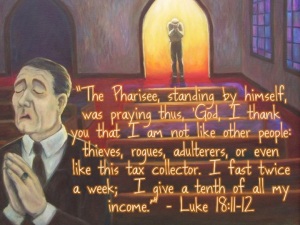“Humbled”
Luke 18:9-14
October 27, 2013, First Presbyterian Church of Jesup
T oday is Reformation Sunday, a day that marks the beginning of the Protestant Church as we know it today. It’s a day for celebrating how far we’ve come as a church. Our affirmation of the priesthood of all believers: which means all of us are called to read and interpret scripture, minister to the community, and have a personal relationship with Jesus Christ. The ways that over the generations we continue to be reformed and always being reformed according to the word of God, a principle that has motivated believers throughout the year to stand up for justice for the enslaved, equality of all of God’s created people, and expand the pulpit to women and minorities. So, let’s just pat ourselves on the back! We’re so righteous, so much better than everybody else!
oday is Reformation Sunday, a day that marks the beginning of the Protestant Church as we know it today. It’s a day for celebrating how far we’ve come as a church. Our affirmation of the priesthood of all believers: which means all of us are called to read and interpret scripture, minister to the community, and have a personal relationship with Jesus Christ. The ways that over the generations we continue to be reformed and always being reformed according to the word of God, a principle that has motivated believers throughout the year to stand up for justice for the enslaved, equality of all of God’s created people, and expand the pulpit to women and minorities. So, let’s just pat ourselves on the back! We’re so righteous, so much better than everybody else!
Wait. That sounds familiar. In fact, that first verse of that passage we just read seems to fit it exactly. “[Jesus] told this parable to some who trusted in themselves that they were righteous and regarded others with contempt.”
Hmm. Maybe it’s not time quite yet for a celebration.
 Our Gospel lesson gives us a rather confrontational passage for this Reformation Sunday. One that shows someone so pleased by their righteousness, a Pharisee. Verses 11-12 tells us, “The Pharisee, standing by himself, was praying thus, ‘God, I thank you that I am not like other people: thieves, rogues, adulterers, or even like this tax collector. I fast twice a week; I give a tenth of all my income.’”
Our Gospel lesson gives us a rather confrontational passage for this Reformation Sunday. One that shows someone so pleased by their righteousness, a Pharisee. Verses 11-12 tells us, “The Pharisee, standing by himself, was praying thus, ‘God, I thank you that I am not like other people: thieves, rogues, adulterers, or even like this tax collector. I fast twice a week; I give a tenth of all my income.’”
 It’s an uncomfortable comparison to put side by side with a Pharisee. In Luke 7:29-30 we are told, that upon hearing of Jesus’ miracles, “All the people who heard this, including the tax collectors, acknowledged the justice of God, because they had been baptized with John’s baptism. But by refusing to be baptized by him, the Pharisees and the lawyers rejected God’s purpose for themselves.”
It’s an uncomfortable comparison to put side by side with a Pharisee. In Luke 7:29-30 we are told, that upon hearing of Jesus’ miracles, “All the people who heard this, including the tax collectors, acknowledged the justice of God, because they had been baptized with John’s baptism. But by refusing to be baptized by him, the Pharisees and the lawyers rejected God’s purpose for themselves.”
Pharisees had confidence in their own goodness, their own ability to follow all the rules, their own efforts to be right by God. In our passage today when the Pharisee is counting his blessings, instead of worry about the salvation of others, he is thankful only that he is not a thief, rogue, adultery, or the tax collector in front of him.
 This tax collector doesn’t try to defend himself when being bad-mouthed by the Pharisee. He wasn’t working on a list of his good deeds or his exceptionalism, rather he defers to God’s great power. In verse 13 we read, “But the tax collector, standing far off, would not even look up to heaven, but was beating his breast and saying, ‘God, be merciful to me, a sinner!’”
This tax collector doesn’t try to defend himself when being bad-mouthed by the Pharisee. He wasn’t working on a list of his good deeds or his exceptionalism, rather he defers to God’s great power. In verse 13 we read, “But the tax collector, standing far off, would not even look up to heaven, but was beating his breast and saying, ‘God, be merciful to me, a sinner!’”
The tax collector isn’t trying to be justified by his own doing, but only by God’s great mercy. He declares himself unworthy on his own.
Lutheran Pastor Nadia Bolz-Weber explains it this way, “You can tell the Law because it is almost always and if-then proposition – If you follow all the rules in the Bible God then will love you and you will be happy. If you lose 20 pounds then you will be worthy to be loved… The Law is always conditional and it is never anything anyone can do perfectly. When we treat Law as Gospel there can never be life and happiness and worthiness.”
The Pharisee was caught up in all the “shoulds,” all the ways that he has worked to live up to the law. The tax collector declares his own unworthiness pursing God’s mercy instead of his own self-worth.  In verse 14 Jesus tells the assembled crowd, “I tell you, [the tax collector] went down to his home justified rather than the [Pharisee]; for all who exalt themselves will be humbled, but all who humble themselves will be exalted.”
In verse 14 Jesus tells the assembled crowd, “I tell you, [the tax collector] went down to his home justified rather than the [Pharisee]; for all who exalt themselves will be humbled, but all who humble themselves will be exalted.”
May we approach God with humbleness this Reformation Sunday, and all days. Amen.